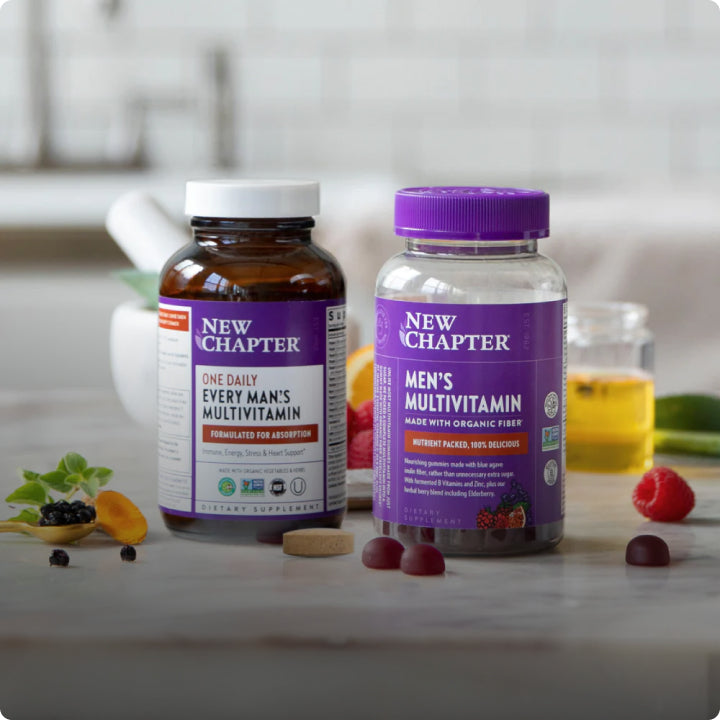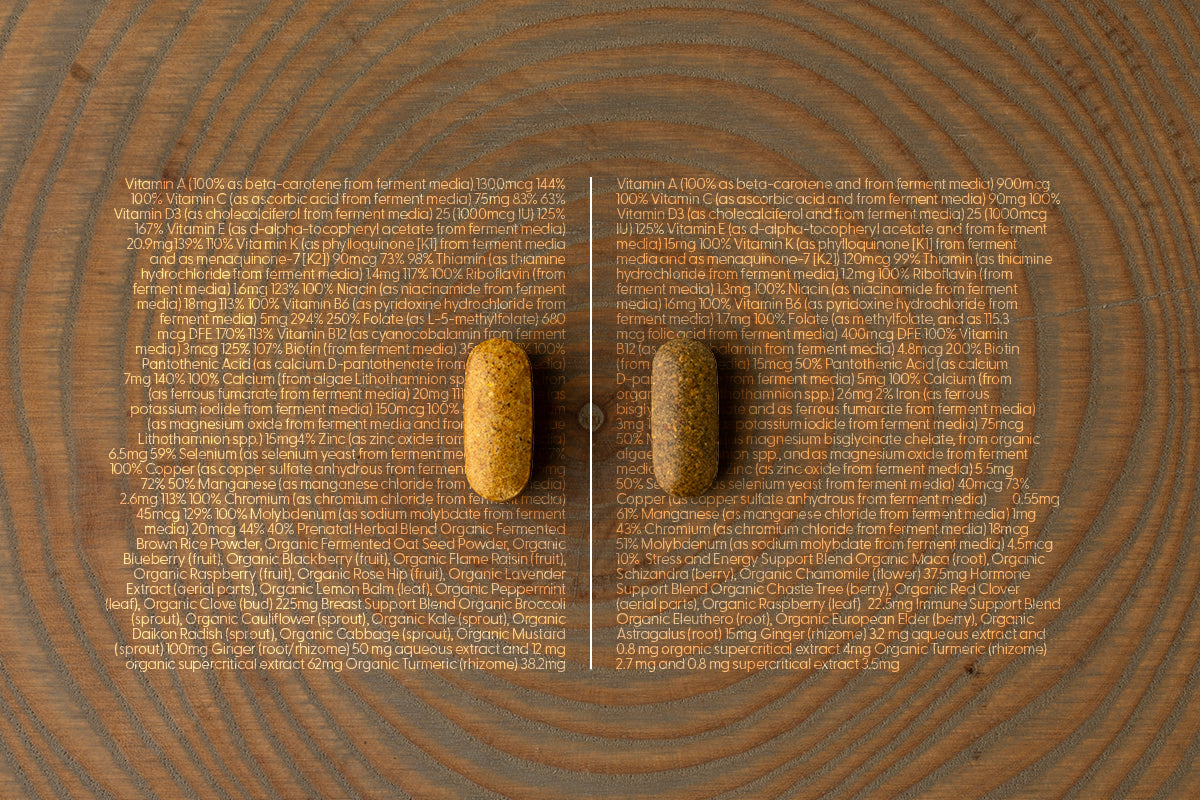Adaptogens and Nootropics: What Are They & What's The Difference?
When selecting the right supplement to support your specific needs, whether you want to reduce stress or enhance cognitive function, there can be a lot of information and products to navigate through. The latest classification of herbs and supplements that have stress-relief seekers headed to supplement aisles is a group of supplements touted as “nootropics.” If you haven’t heard about nootropics or you’re unsure how they differ from adaptogens, you are not alone! Quick summary: Adaptogens are known for helping your body adapt to situations, whereas a nootropic can help “turn/bend the mind.” The term nootropic was coined in the 1960’s by Romanian chemist Corneliu Giurgea, and has roots in the Greek words for “mind” (noos) and “bend or turn” (tropein). Let’s explore what it means to “turn the mind” and how the health benefits of nootropics compare with adaptogens.
What is an Adaptogen?
When you’re feeling stressed, nature’s answer is the adaptogen. Our bodies undergo different types of stress every day, such as from environmental stressors or the work grind. Your body handles stress by working to respond and rebalance. Sometimes stress can feel mentally or physically overwhelming, and this is where the mighty adaptogen can help.
Benefits of Adaptogens
If you’re feeling pervasive stress, adaptogens can help by balancing the production of stress hormones, like cortisol. The benefits of adaptogens are many, but many people struggle to find the right adaptogen to help support their particular needs. Not all adaptogens have the same effect, so finding your herb can be crucial to an adaptogen’s success.
Commonly Used Adaptogens
Holy Basil
The illustrious and royal herb also known as Tulsi has been an adaptogenic herbal favorite for many millennia. This “queen of herbs” is a great source of ursolic acid. Ursolic acid has been shown to reduce levels of cortisol, a stress hormone produced by your brain. When you lower cortisol levels, the benefits include balanced blood sugar and even immune support. The effects of Holy Basil are often compared to having a glass of wine. It can help to take the edge off of your stress , but not cause you to feel drowsy or sleepy.
Eleuthero
Eleuthero, also known as Siberian Ginseng, is almost the opposite of Holy Basil. While Holy Basil chills you out, Eleuthero supports your body’s energy levels to help overcome stressful situations. Eleuthero contains eleutherosides , which naturally occur in the root and rhizome of Eleuthero. By supporting healthy circulation in the body, the brain is supported with extra blood flow, so Eleuthero may support memory and concentration, as well.
Rhodiola
Rhodiola functions in a similar way to Eleuthero, helping you to perform through stress, which is often felt in the workplace. Rhodiola is well-respected in Europe and has been traditionally used in Scandinavian countries to support endurance and work performance. An intriguing study on Rhodiola shows an increase in test performance by doctors who work overnight shifts AFTER their shift had taken place. The study showed Rhodiola’s ability to reduce general fatigue under stressful situations, which is exciting for anyone who’s had to grind through a stressful shift.
Ashwagandha
Ashwagandha has been revered in traditional Ayurvedic medicine practice for centuries. Known traditionally for connecting mind and body, Ashwagandha features withanolides and other beneficial phytonutrients that help your body adapt to stress. You can check out our blog on super-herb Ashwagandha here.
Reishi
Reishi mushroom is also known as the “mushroom of longevity.” Cortisol, the stress hormone, is made in the adrenal glands. The adrenal glands sit on top of your kidneys, and Reishi is known for supporting these important glands that are tied to the way your body handles stress. Reishi mushroom also boosts immune health, as it contains beta glucans, a nifty polysaccharide that binds with your body’s natural defense system.
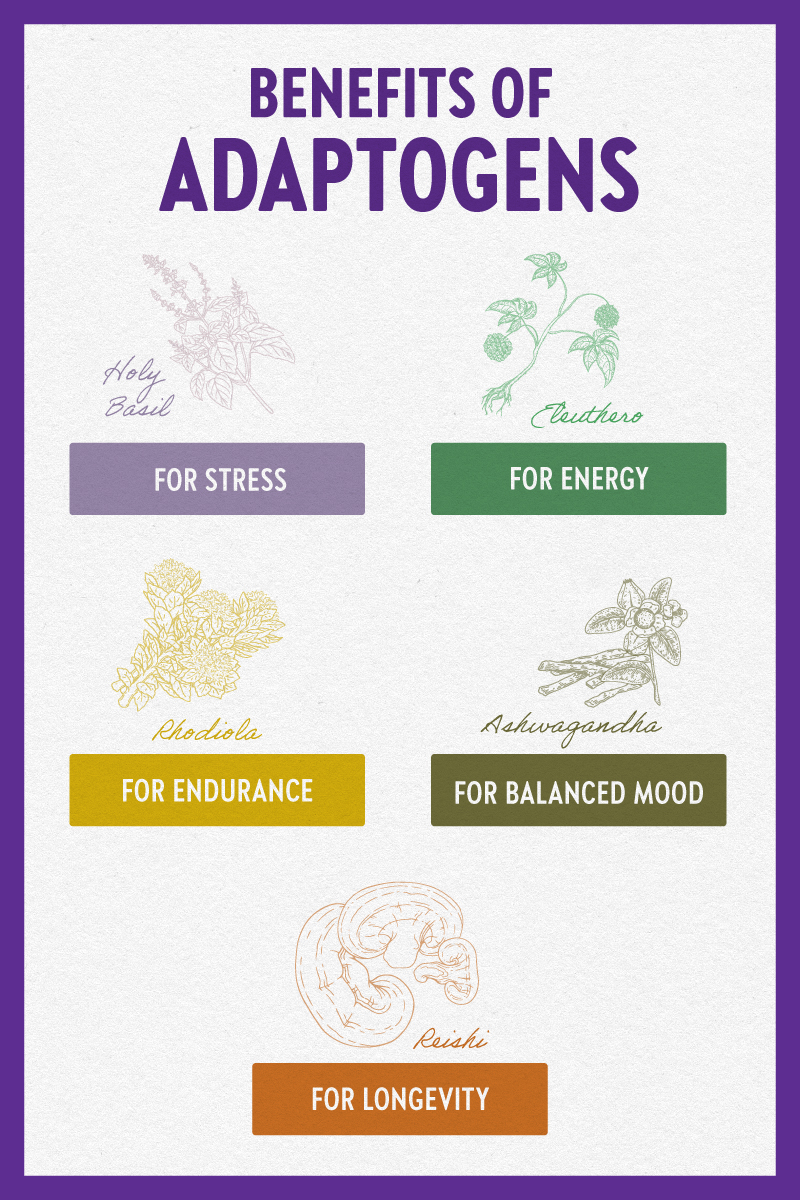
What is a Nootropic?
Let’s shift gears now and take a look at nootroopics. Are they real-life “smart drugs,” or something a bit more subtle? Nootropics, while sharing some similarities with adaptogens, are really in a class of their own. While adaptogens help the body adapt to stress, nootropics help the mind to adapt. Corneliu Giurgea’s research to define nootropics first referred to pharmaceuticals, but there are certainly natural ingredients for cognitive support that meet some of the criteria he set out for defining a nootropic. Giurgea wrote that a nootropic should:
- Enhance learning ability
- Enhance how your brain resists learned behaviors which may be disruptive
- Protect the brain from various physical or chemical imbalances
- Increase the body’s ability to control muscle contractions and relaxations
- Have low side effects and avoid sedation.
To sum it up, nootropics help your brain to react and protect itself against stress without sedation or loss of skill.
Benefits of Nootropics
It’s important to note that just as each adaptogen has unique ways it helps the body adapt to stress, each nootropic is also unique in how it supports cognitive function.
Commonly Used Nootropics
Lion’s Mane
Lion’s Mane mushroom ( Hericium erinaceus) has exciting research associating it with supporting nerve outgrowth, as well as nerve growth factor. Lion’s Mane, put simply, helps your brain to better communicate with itself. This beautiful waterfall of a mushroom tends to attach itself to the side of hardwood trees. It has been referred to as a nootropic often and shows properties that would be consistent with Giurgea’s rules for nootropics.
Adaptogenic Herbs
Yes, many adaptogenic herbs that help support the body can also classified as nootropics! Remember Rhodiola and its amazing ability to help keep your cognition intact when under stress? That would qualify it as a nootropic under Giurgea’s definition.
B Vitamins
B Vitamins also have nootropic qualities, since they help the mind adapt to stress and support healthy brain and nerve function. According to research, B vitamins support our brains by helping to produce chemicals that affect our mood.
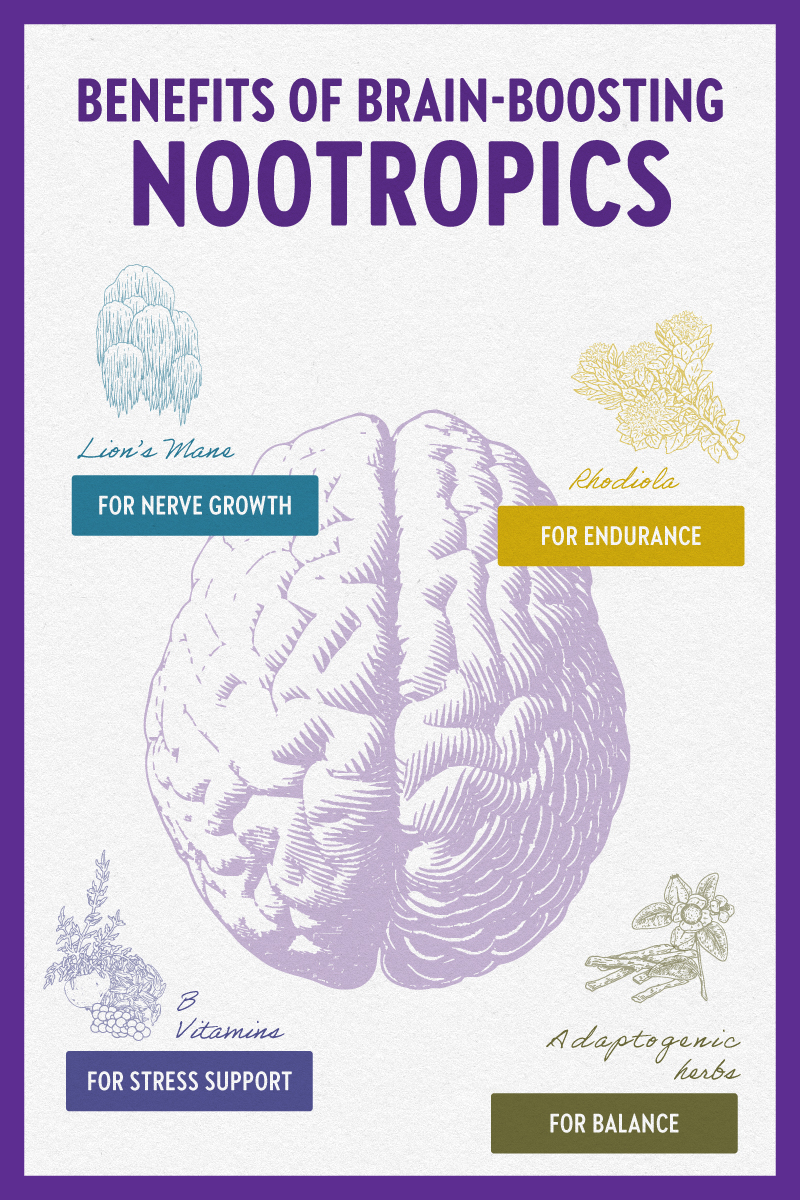
How Stress Can Affect the Body
The term stress was coined by endocrinologist Hans Selye in 1936, and it was defined as the “non-specific response of the body to any demand for change.” Change, in our world, is constant. Therefore, stress is a part of everyday life and chronic stress levels are on the rise. There are variables that can increase or decrease the amount of stress in a situation, like the novelty of a situation, the unpredictability of a situation, a threat to the ego, or a challenge to our sense of control. All of these factor into how we deal with stress and how much it can affect our health.
Stress affects every system in the body. This includes the musculoskeletal system, like when muscle contractions are caused by shunting blood flow to major muscle groups, or when hormones adrenalin and cortisol are released during our fight or flight response. Stress can also challenge our cardiovascular system, immune system, digestive system, and even reproductive health. Our cognitive function is also affected. When the brain experiences stress and anxiety, there’s an uptick in activity in parts of the brain that help us process emotions and make decisions.
Nootropics and adaptogens are useful for supporting the body through times of stress, both cognitively and in general health.
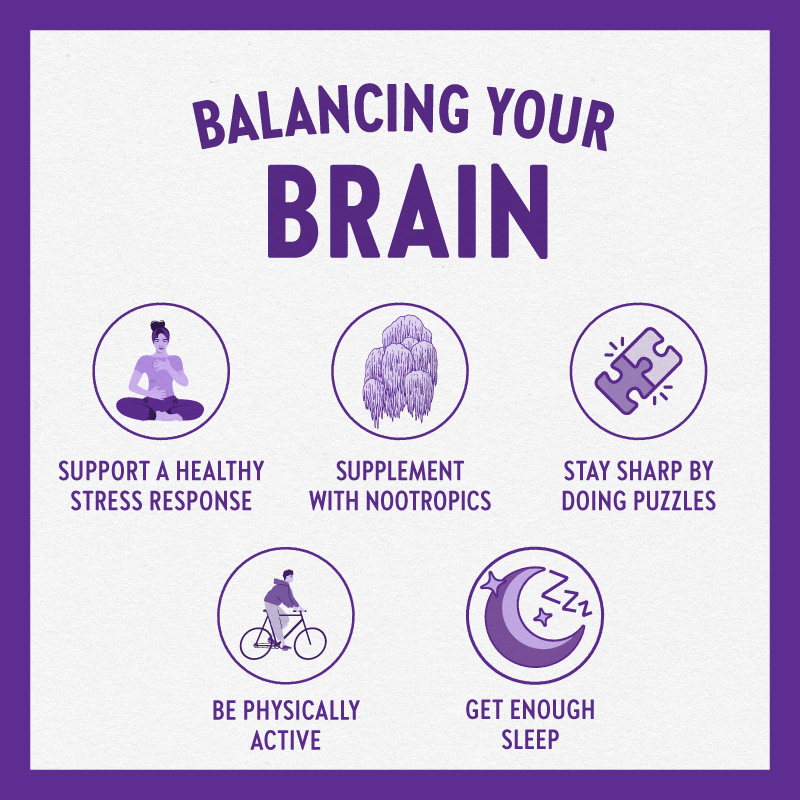
Can You Take Both Adaptogens and Nootropics?
You can mix and match, but it’s important to take your time in deciding which herb you want to take and allowing time to evaluate how it’s working for you. As noted above, some herbs have both adaptogenic and nootropic action, which can make it a good choice for meeting mental and physical needs.
When you select an adaptogen or nootropic from the botanical kingdom, herbal identity is everything. You’ll want to have ID verification on herbs that you take, and New Chapter ®’s quality standards and partnership with Alkemist Labs help to ensure that what is listed on the side of the box is indeed what’s in the bottle. Also, New Chapter DNA verifies our mushrooms, so that you get the true Ling Zhi Reishi that has been revered throughout Traditional Chinese Medicine, as well as authentic Lion’s Mane mushroom.
Ways to Take Adaptogens and Nootropics
Herbalists often recommend to take a new herb for a period of around two weeks, and pay close attention to how it makes you feel. If you start taking everything at once, something could be working for you and something could not be, and it’s hard to know which is which. Talk to your healthcare provider with any questions about finding the right adaptogens or nootropics for you.
When looking to make your “mind bend” and help your body adapt to stress, you can build a routine that works for you with trusted quality supplements at New Chapter. We’re here for you in good times and tough times, with products expertly formulated to bring you the good stuff for holistic wellness.



